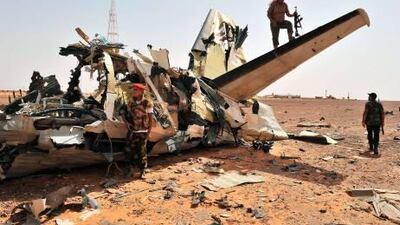Libya's transitional leadership deployed its fighters around cities loyal to Colonel Muammar Qaddafi, threatening to attack unless the loyalists surrender and pressing forward with their search for the former leader.
Negotiations for the peaceful surrender of the city of Bani Walid have collapsed, Al Jazeera reported yesterday, quoting local officials and fighters. Inside the city, leaders were divided. Troops loyal to the transitional leadership were ready to launch an attack within 24 hours, Al Jazeera said.
Commanders with the transitional government force estimate "no more than 100" Qaddafi soldiers remain in Bani Walid.
The NTC oil minister, Ali Tarhouni, said yesterday that the NTC fighters know where Col Qaddafi is hiding, according to Al Jazeera, the Doha-based news network.
The head of the Libyan National Transitional Council, Mustafa Abdel Jalil, said yesterday its forces will pressure the cities of Sirte, Bani Walid, Jufra and Sabha until they give up, while continuing to supply them with humanitarian aid.
Since rebels captured Tripoli in late August, transitional authorities have been trying to restore stability, consolidate military gains and capture Col Qaddafi.
More than six months of fighting to end his 42-year rule have reduced oil production and disrupted power supplies in the country with Africa's largest crude reserves.
Mr Jalil said in Benghazi: "We are by the grace of God in a position of strength, capable of entering any city,"
The Misurata Military Council said it deployed its most powerful unit, the 500-man Halbus Brigade, around Bani Walid and it has observed that pro-Qaddafi defensive positions have been abandoned.
British aircraft struck nine weapons and ammunition sites near Sirte, the ministry of defence spokesman Major General Nick Pope said yesterday.
Libya's new leadership has extended to Saturday the deadline for Col Qaddafi loyalists in his hometown of Sirte to surrender.
Col Qaddafi promised to fight on and turn the country "into a hell" in an audio recording broadcast by Syria-based Arrai satellite television.
Mr Jalil said the NTC would move its headquarters to Tripoli from Benghazi, and pledged to hold presidential and legislative elections within 20 months, according to Agence France-Presse.
While opposition supporters now control most of Libya, Col Qaddafi has avoided capture.
The former rebels believe he may be in one of their three key targets: Sirte, 450 kilometres south-east of Tripoli; Bani Walid, which lies 145km south-east of Tripoli; or Sabha, home to a major military base about 650km south of the capital.
The new Libyan leaders anticipate restoring oil output "within a reasonable time".
The pace of restoring production rests on how soon oil companies return their workers, said Ahmed Jehani, the minister for reconstruction in the transitional administration.
Libyan oil production slumped to 60,000 barrels a day in July from 1.7 million barrels in January, according to the Paris-based International Energy Agency.
There was little damage to infrastructure, Mr Jehani said.
Most of the required work involves restoring pressure to wells and cleaning sludge out of pipelines and storage facilities.
"Many of our fields are concessions held by international companies, so they are the ones that have to do the work," Mr Jehani said. "We can't do it for them. It depends on how fast they deploy back to the country."
Silvio Berlusconi, the prime minister of Italy, the largest buyer of Libyan energy, this said week that Italy's Eni is aiming to re-open a gas pipeline between the two countries by October 15.
Crude oil fell on concerns fuel consumption will drop in the world's largest economy. Aref Ali Nayed, the operations coordinator for the National Transitional Council's stabilisation team, said in a press conference that Eni and at least four other oil companies have sent advance teams to the country. He would not name the others.
Restoring output "could be faster than some people think," Mr Jehani said.

